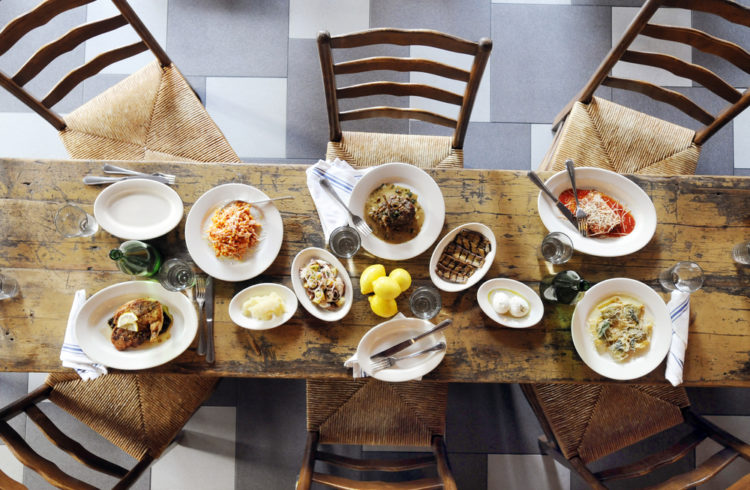The season for feasting has arrived! Roasted chestnuts, decorated gingerbread cookies, and homemade eggnog are cherished foods this time of year. ’Tis the season to pull family recipes from the dusty confines of the cabinet and imbibe in the foods that fill us with memories of people and events from our past.
It may be surprising to discover that delighting in food, feasting, and memories is a biblical principle.
The interconnectedness between food, community, and memory is so significant that it was included in the Israelite law code. The book of Deuteronomy describes three communal feasts embedded in the foundation of Israelite life. Feasting drew people together as a community and encouraged the recollection of a shared memory of God’s deeds in the past and of their identity as God’s people.
Since we are in the season of eating foods saturated with memories, this is a great time to explore the power of the feast in biblical tradition. Delighting in food, feasting, and sharing memories is a biblical tradition. Click To Tweet
The Biblical Feasts
The three significant pilgrimage festivals described in Deuteronomy are explicitly attached to the agricultural calendar.
The Passover Feast
Israel’s land only had two seasons—the dry and the rainy season. People depended on the land for survival, so the weather patterns dictated life. Our modern world ushers in the New Year on January 1, but the Israelites began their new year in September/October when the first rains broke the dry spell and initiated the agricultural season. The heaviest rains came from December through February, and as the rains tapered off, the harvest season began.
In late March or early April, farmers completed the barley harvest and then everyone celebrated Passover—a festival designed to remind the Israelites of God’s powerful intervention to bring them out from under the oppressive hand of Egypt.
Consuming foods that were atypical evoked specific memories of the past and brought them to mind in the present. The memories helped people reengage with the emotion of past oppression, giving them the capacity to empathize with those in their present who experienced similar oppression.
The Feast of Weeks
In May, the farmers finished the wheat harvest. At the conclusion of the harvest, people celebrated the Feast of Weeks (Shavuot). Although this holiday is described in Deuteronomy as an agricultural celebration, it is elsewhere connected to the Israelites’ time at Mt. Sinai when they made the covenant with God.
The Feast of Booths
From June to August, the farmer was busy in the fields coaxing the summer fruit to flourish during the dry season. The agricultural cycle ended in September/October with the olive harvest. The completion of the annual harvest was paired with the Feast of Booths (Succoth or Feast of Tabernacles) during which time the people remembered how God provided for their forefathers in the wilderness just as he provided for his people that year. As God did in the past, so he has done again in the present.
Think of how brilliant it was to connect the religious calendar to the land. As the land went through its annual cycle, it pulled people through the memory of God’s personal involvement in their past. Passover marked God’s initial act of salvation and the feast of Booths marked the completed act of salvation when God brought the people into their land of inheritance. In the Old Testament, Israel's religious calendar was connected to the land itself. Click To Tweet
How Feasting Forms Community
The Bible underscores the fact that not only is the memory of God’s deeds significant but also the people’s response to God’s deeds. Because God saved the people from oppression and Egypt, and because God gifted the people with land, the people were instructed to act with compassion towards all people in the community.
The agricultural laws in Deuteronomy 24 were remarkably counter-intuitive because Israel was told to have restraint in harvesting the land’s most economically viable crops. When landowners reaped the grain, they were not to double back to gather every possible grain (so too with grapes and olives). Instead, they were to allow the sojourner, orphan, and widow an opportunity to glean in the fields.
Restraint in harvest practices not only protected the integrity of the poor by giving them opportunities to work and to receive sustenance from the fields, but it also allowed the marginalized to experience, with the rest of the community, the blessing of God’s provisions. They harvested when others harvested. They feasted when others feasted. The poor knew that they belonged to the land and were seen, valued, and cared for by the larger community. They, like the larger community, remembered the national narrative that was intertwined with the agricultural calendar.
Life’s misfortunes impoverished them, and yet they too belonged to the community of God’s people and experienced God’s provisions.
Last fall, when my Deuteronomy students at Biblical Theological Seminary studied feasting and memory, everyone brought food from home to share with the class. The dinner break, which is when students normally scatter to buy food at local eateries, was turned into a communal meal and was filled with lively chatter. No one contemplated who forgot to bring food or who brought the fanciest dish, because all were feasting from the same table. We had a wonderfully random collection of homemade sushi rolls, salads, kimchi, and fresh bread dipped in olive oil. Sharing food from home initiated interesting conversation between students. The banter among all of us increased as we shared the meal and the sense of connectivity grew.
Similarly, during the three Israelite feasts mentioned above, people brought portions of their harvest to the Temple. They left their villages and cities that defined their role and status in society and gathered together as one community and ate with equality from God’s table. Orphans, widows, and refugees were not considered outsiders; they were members of the same society. Rather than pushing those who were not landowners to the periphery, the poor were enveloped by the rest of the community. The festivals were inclusive activities for all people in which they celebrated the provision of the land which sustained them. During Israel's feasts, people brought portions of their harvest to share, gathering as one community to eat with equality at God's table. Click To Tweet
What is God Doing Through Your Christmas Feasting?
Food is a powerful container for memories. Connecting feasting with memories of what God accomplished in the past is a valuable tool for all of us forgetful humans.
This season, as we pull out family recipes and eat the unique foods of the season, let’s be mindful of the way in which memories are attached to foods. Allow the memories to help you reflect on and share with one another the past deeds of God, because those memories bolster your faith in the present.
Perhaps this holiday season can also be a time to ask questions abut the modern equivalent of exercising self-restraint to allow those who are marginalized in society to participate in the greater church community. Can we creatively find ways to make room for those who are often pushed to the margins, so they too can experience God’s provision?
In this season, feast! Feast, rejoice, and remember who God is—and who you are as his chosen.




Missio Alliance Comment Policy
The Missio Alliance Writing Collectives exist as a ministry of writing to resource theological practitioners for mission. From our Leading Voices to our regular Writing Team and those invited to publish with us as Community Voices, we are creating a space for thoughtful engagement of critical issues and questions facing the North American Church in God’s mission. This sort of thoughtful engagement is something that we seek to engender not only in our publishing, but in conversations that unfold as a result in the comment section of our articles.
Unfortunately, because of the relational distance introduced by online communication, “thoughtful engagement” and “comment sections” seldom go hand in hand. At the same time, censorship of comments by those who disagree with points made by authors, whose anger or limited perspective taints their words, or who simply feel the need to express their own opinion on a topic without any meaningful engagement with the article or comment in question can mask an important window into the true state of Christian discourse. As such, Missio Alliance sets forth the following suggestions for those who wish to engage in conversation around our writing:
1. Seek to understand the author’s intent.
If you disagree with something the an author said, consider framing your response as, “I hear you as saying _________. Am I understanding you correctly? If so, here’s why I disagree. _____________.
2. Seek to make your own voice heard.
We deeply desire and value the voice and perspective of our readers. However you may react to an article we publish or a fellow commenter, we encourage you to set forth that reaction is the most constructive way possible. Use your voice and perspective to move conversation forward rather than shut it down.
3. Share your story.
One of our favorite tenants is that “an enemy is someone whose story we haven’t heard.” Very often disagreements and rants are the result of people talking past rather than to one another. Everyone’s perspective is intimately bound up with their own stories – their contexts and experiences. We encourage you to couch your comments in whatever aspect of your own story might help others understand where you are coming from.
In view of those suggestions for shaping conversation on our site and in an effort to curate a hospitable space of open conversation, Missio Alliance may delete comments and/or ban users who show no regard for constructive engagement, especially those whose comments are easily construed as trolling, threatening, or abusive.